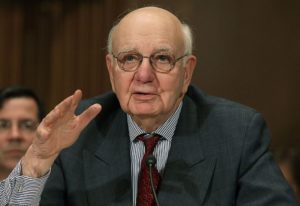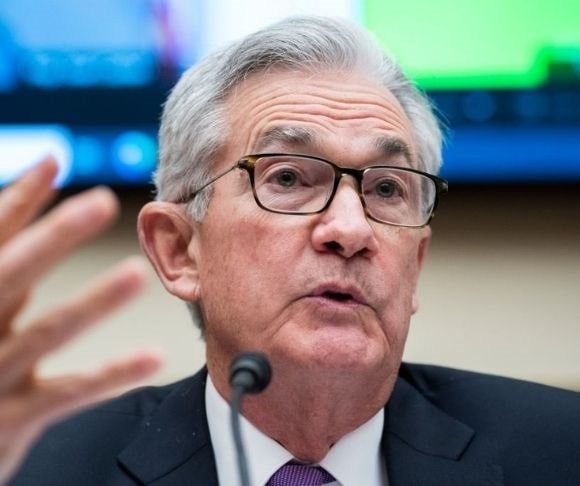It is 1982 all over again. In 2021, the post-COVID U.S. economy is dealing with rampant price inflation, anemic economic growth, and a ballooning federal deficit. But will public policymakers respond with conventional economic panaceas or insist that approving deficit-financed spending bills will be the cure for the highest inflation rate in 39 years? While the White House might be blind to the reality facing Main Street, the Federal Reserve may need to intervene and take action. The only way to do so would be to summon the spirit of the late Paul Volcker, the inflation buster of the early 1980s.
The Volcker Way

Paul Volcker (Photo by Mark Wilson/Getty Images)
In the late 1970s and early 1980s, the United States was paying for the guns and butter of the 1960s: President Lyndon Baines Johnson’s Great Society initiative and President Richard Nixon’s Shock to the economic system. From Democrats’ astronomical spending to Republicans’ socialist policy measures, these programs contributed to the inflationary environment prevalent four decades ago.
President Jimmy Carter tapped Paul Volcker to helm the U.S. central bank, and this might have been one of the few successful decisions made by the 39th president. The cigar-smoking Tall Man was not concerned about slowing down the production from the printing press and raising interest rates.
As the period of Great Inflation topped out at nearly 15%, Volcker and the Eccles Building raised the benchmark interest rate to a peak of 20%. Both sides of the aisle were perturbed because higher rates meant adhering to greater fiscal restraint. Consumers and industries throughout the marketplace slammed the move to tighten monetary policy. Because Volcker slowed down the excessive flow of money into the economy, it became more expensive to borrow capital, be it to purchase a residential property or spend money Uncle Sam did not possess.
In his second year of his first term as the head of the most powerful institution in the world, Volcker made interesting remarks in front of the National Press Club, comments that ring true 40 years later: “We have become accustomed to living with inflation, adjusting to it — and anticipating more. And as we have done so, we unwittingly set in motion forces that have kept it going.”
Many consumer and economist surveys suggest that inflation will remain a significant fixture of the U.S. economy for the next one to five years. But what will today’s Fed chair, Jerome Powell, do to fight a skyrocketing consumer price index (CPI), producer price index (PPI), and personal consumption expenditure (PCE) price index?
The Powell Putsch
The Federal Reserve will complete its two-day policy meeting for December on Dec. 15. While most market analysts and money managers do not anticipate that the Federal Open Market Committee (FOMC) will agree to raise interest rates, the central bank might pull the trigger on an earlier-than-expected rate hike in the first or second quarter of 2022. Powell has conceded that the Fed can be patient on the inflation front, but after the latest Bureau of Labor Statistics (BLS) data showing the annual inflation rate at a 39-year high, time is not on the institution’s side.
So, what can be done to curb price inflation? The first answer may be to acknowledge the root causes of sky-high inflation: astronomical monetary and fiscal expansion, a global supply chain crisis, and an economy that has been pumped with trillions of dollars in cheap money. It is too much cash chasing too few goods and services. Unfortunately, the Fed has only acknowledged only one of these factors.
Still, the short-term answer may be raising the federal funds rate by 25 or 50 basis points. But not everyone is convinced this would succeed. Tyler Goodspeed, the former acting chairman of the Council of Economic Advisers, recently told the Fox Business Network that that two rate hikes in 2022 may not suffice, although the broader financial markets certainly think they might. Goodspeed asserted that there are too many inflationary pressures today, from soaring employment costs to ballooning energy prices.
[memberzone align=”left”] “So I think the bigger picture macro situation still points to a lot of inflationary pressure, and I don’t know that the two rate hikes are going to cut it,” he said.
Perhaps the answer to today’s inflationary problem is to go cold turkey. This would consist of shutting off the printing presses by increasing rates substantially. The Fed has already injected approximately $6 trillion into the economy over the last 20 months, so it is unlikely that Main Street and Wall Street would be starved of liquidity. But while this would be a tough pill to swallow for a small business located on 123 Elm Street or hedge funds on 11 Wall Street, it would impact politicians the most. They are able to get away with trillions in deficit-financed and deficit-busting spending because the Fed scoops up the Treasury securities.
In the end, after being nominated for a second term at the Fed, it is doubtful that Powell and Co. would completely remove the spiked punch bowl from the White House or Congress. Instead, the institution would merely water it down slightly. However, the damage has already been done – and this is turning into a contagion event because larger sectors of the economy have metastasized into dependents after becoming accustomed to nearly two years of something for nothing.
A Defeatist Attitude
It is safe to say that the American people are hopeless. President Joe Biden’s approval rating is abysmal, the Federal Reserve Bank of New York’s Survey of Consumer Expectations shows Americans anticipate fresh, all-time high inflation moving forward, and consumer sentiment is still hovering around a decade low. And yet, the Ivory Tower class believes that low- and middle-income households are not impacted by inflation. These are the folks who either author policy or champion the ruling class’ legislative campaigns. It is more than likely that Powell will pivot again, whether it is regarding inflation or monetary policy, but will it be based on his channeling of Volcker or listening to the wisdom of the Paul Krugmans of the world?
~ Read more from Andrew Moran.




